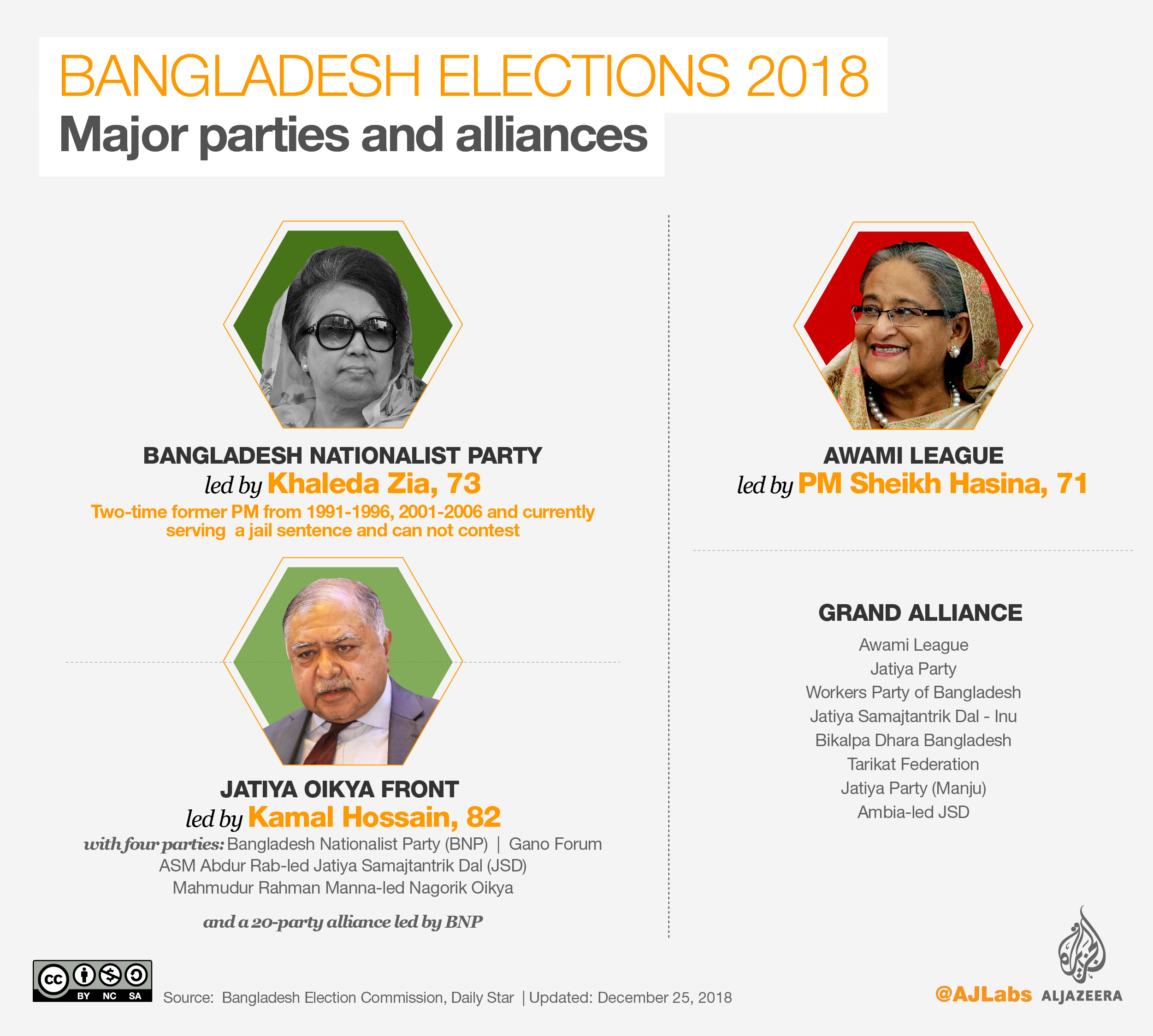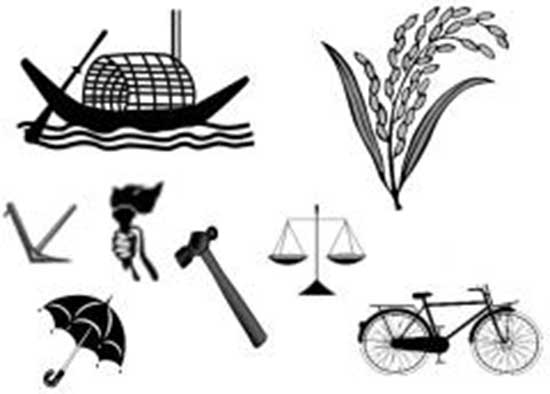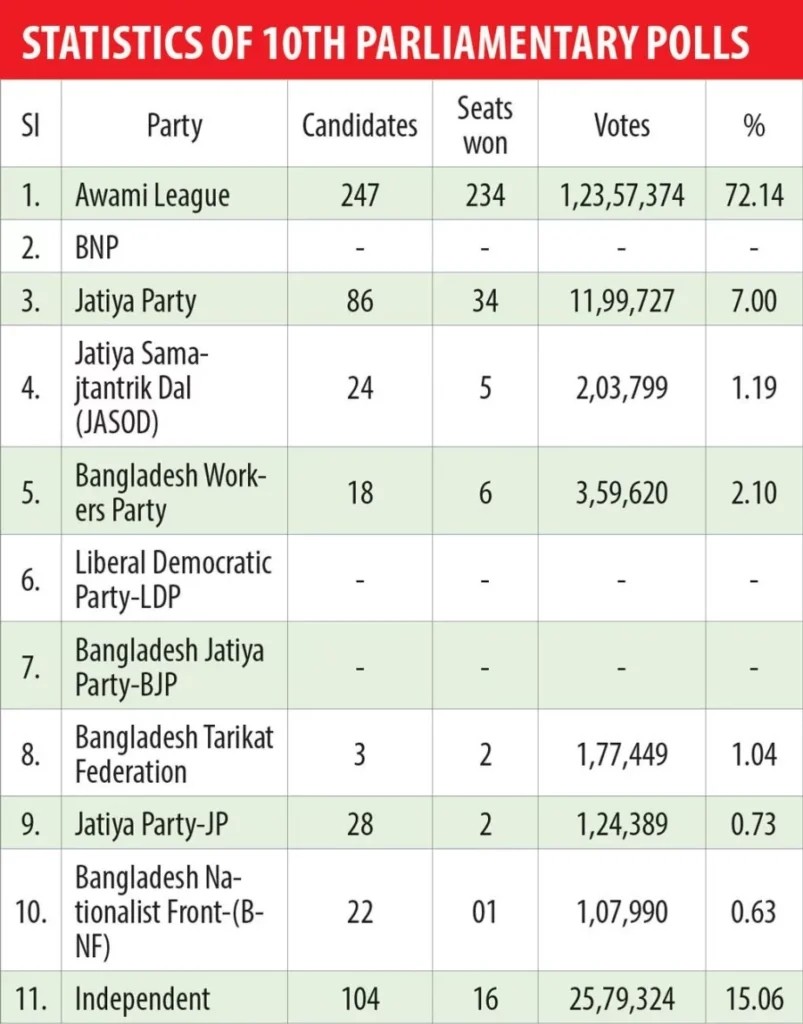The political parties in Bangladesh include the Bangladesh Nationalist Party (BNP), Bangladesh Awami League, and Jatiya Party. These parties have played significant roles in the country’s political landscape.
Introduction To Bangladesh’s Political Landscape
Bangladesh’s political landscape is characterized by a diverse and dynamic multi-party system. The country’s political scene is marked by the presence of several significant political parties that play pivotal roles in shaping the nation’s governance and policies.
The Significance Of Political Parties
Political parties hold immense significance in Bangladesh’s democratic framework. They serve as vehicles for representing diverse interests and ideologies, mobilizing public support, and influencing policy decisions. The presence of multiple political parties fosters a competitive political environment, enabling citizens to express their preferences through democratic processes.
Overview Of The Multi-party System
Bangladesh operates under a multi-party system, where various political parties compete for electoral mandates and participation in governance. This system promotes diversity of thought and representation, allowing for a range of perspectives to contribute to the country’s development and progress.

Credit: www.aljazeera.com
Major Political Forces
Bangladesh is home to several major political parties that play a significant role in shaping the country’s political landscape. The three major political forces in Bangladesh are the Bangladesh Awami League, the Bangladesh Nationalist Party (BNP), and the Jatiya Party. Each of these parties has its own distinct ideologies and support bases, making them key players in the country’s political arena.
Bangladesh Awami League
The Bangladesh Awami League, often referred to as AL, is one of the oldest and most prominent political parties in Bangladesh. It was founded in 1949 and has been a major force in the country’s politics since its independence in 1971. The party’s ideology is rooted in Bangladeshi nationalism, and it has a strong support base, particularly in urban areas.
Bangladesh Nationalist Party (bnp)
The Bangladesh Nationalist Party, commonly known as BNP, is another influential political force in Bangladesh. Established in the late 1970s, the party has been a key player in the country’s politics, often competing fiercely with the Awami League. BNP’s ideology is centered around Bangladeshi nationalism, and it has a significant following, especially in rural areas.
Jatiya Party (ershad)
Jatiya Party, also known as JP-E, is a political party in Bangladesh that was founded by General Hussain Muhammad Ershad, a former military ruler of the country. The party’s ideology encompasses Bangladeshi nationalism and conservatism. Jatiya Party has been a prominent force in Bangladeshi politics, particularly during the 1980s and 1990s, and continues to be a significant player in the political landscape.
Emerging And Minor Parties
Bangladesh has several major political parties, including the Bangladesh Nationalist Party, Bangladesh Awami League, and Jatiya Party. However, there are also emerging and minor parties, such as the Communist Party of Bangladesh and Liberal Democratic Party, which have smaller support bases.
Emerging and Minor Parties in Bangladesh Political Parties List In addition to the three major political parties in Bangladesh, there are also several emerging and minor parties that play a role in the country’s politics. These parties often represent specific interests or ideologies and may not have the same level of influence as the major parties. Here are some of the emerging and minor parties in Bangladesh:Communist Party Of Bangladesh
The Communist Party of Bangladesh (CPB) is one of the oldest political parties in the country, having been founded in 1948. The party is based on Marxist-Leninist ideology and advocates for a socialist state. However, the CPB has never been able to gain significant electoral success in Bangladesh.Liberal Democratic Party
The Liberal Democratic Party (LDP) is a relatively new party, having been founded in 2006. The party is center-right and advocates for free-market economics and individual liberty. The LDP has not yet had much success in national elections, but it has gained some support in local elections.Islamic Parties And Their Influence
Islam plays an important role in Bangladeshi politics, and there are several Islamic parties that have a significant influence. These parties advocate for the implementation of Islamic law and the protection of Muslim interests. Some of the major Islamic parties in Bangladesh include the Bangladesh Jamaat-e-Islami, the Islami Oikya Jote, and the Hefazat-e-Islam Bangladesh. Despite their influence, Islamic parties have faced criticism for their role in promoting religious extremism and intolerance. In recent years, there has been growing concern about the influence of Islamic parties in Bangladeshi politics and their impact on the country’s democratic values. Overall, while the major political parties in Bangladesh dominate the political landscape, there are also several emerging and minor parties that play a role in shaping the country’s political future. Whether through Marxist-Leninist ideology, center-right economic policies, or Islamic principles, these parties represent the diverse interests and values of the Bangladeshi people.Ideologies And Objectives
Political parties in Bangladesh are driven by various ideologies and objectives that shape their policies and actions. Understanding these ideologies is crucial to gaining insight into the dynamics of Bangladesh politics. In this section, we will explore three prominent ideologies that influence the country’s political landscape: nationalism, communism, and conservatism.
Nationalism And Its Variants
Nationalism plays a significant role in Bangladesh’s political parties. The Bangladesh Awami League (AL) and the Bangladesh Nationalist Party (BNP) are both grounded in Bangladeshi nationalism. The AL, founded by Sheikh Mujibur Rahman, advocates for the rights and welfare of the people of Bangladesh and strives to protect and promote the country’s cultural heritage. On the other hand, the BNP, under the leadership of Khaleda Zia and later her son Tarique Rahman, focuses on preserving and upholding the interests of the Bangladeshi nation.
Communism And Marxism-leninism
The Communist Party of Bangladesh (CPB) is a prominent political party in Bangladesh that follows communist ideologies. The CPB aims to establish a socialist society through the principles of communism and Marxism-Leninism. They prioritize the welfare of the working class, advocate for income equality, and support the nationalization of industries and resources. The party’s objective is to create a society free from exploitation and oppression, where the means of production are collectively owned.
Conservatism In Bangladesh Politics
Conservatism also holds a place in the political landscape of Bangladesh. The Jatiya Party (JP), led by Hussein Muhammad Ershad, espouses conservative principles and values. The JP emphasizes the importance of tradition, stability, and order in society. They strive to protect the nation’s cultural heritage while advocating for economic development and prosperity. The party seeks to uphold conservative values and promote a balanced approach to governance.
In conclusion, the political parties in Bangladesh are driven by diverse ideologies and objectives. Nationalism, communism, and conservatism are three significant ideologies that shape the policies and actions of these parties. Understanding these ideologies provides valuable insights into the dynamics of Bangladesh’s political landscape.
The Role Of Political Parties In Governance
In a democratic system, political parties play a pivotal role in governance. They are the primary means by which citizens can participate in the political process, and they serve as a link between the government and the people. Political parties in Bangladesh have been instrumental in shaping the country’s political landscape since its independence in 1971.
Legislative Influence
Political parties in Bangladesh have significant legislative influence. The number of seats a party holds in parliament determines the degree of influence they have in shaping public policy. The ruling party, for instance, has the power to introduce and pass legislation that reflects its political agenda. Opposition parties, on the other hand, are responsible for scrutinizing the government’s policies and holding them accountable for their actions. This system of checks and balances ensures that the government remains accountable to the people and that the interests of all citizens are represented in parliament.
Participation In Local And National Elections
Political parties in Bangladesh participate in both local and national elections. These elections are held regularly to determine the composition of parliament and local government bodies. The election process is competitive, and parties are required to campaign vigorously to win the support of voters. Political parties that are successful in these elections are given the mandate to govern and make decisions on behalf of the people.
Political Parties And Public Policy
Political parties in Bangladesh play a significant role in shaping public policy. They formulate their policy positions based on their political ideology, which reflects the interests and aspirations of their supporters. The policies of political parties can have a significant impact on the lives of citizens, particularly in areas such as education, healthcare, and economic development. For this reason, it is essential that political parties engage in constructive dialogue with each other to develop policies that are in the best interests of the people.
In conclusion, political parties in Bangladesh play a crucial role in the country’s governance. They are responsible for shaping public policy, ensuring that the government remains accountable to the people, and representing the interests of all citizens. As such, it is essential that citizens engage with political parties and participate in the political process to ensure that their voices are heard and their interests are represented.

Credit: www.researchgate.net
Challenges Facing Political Parties
Political parties in Bangladesh face numerous challenges in their pursuit of power and influence. From internal conflicts and factionalism to corruption and accountability issues, these challenges pose significant obstacles to the stability and success of political parties in the country. Additionally, international relations can impact the operations and goals of political parties, adding to the complexity of the political landscape in Bangladesh.
Internal Conflicts And Factionalism
One of the most significant challenges facing political parties in Bangladesh is internal conflicts and factionalism. These issues can arise due to differences in ideology, strategy, and leadership, among other factors. In some cases, these conflicts can lead to the formation of splinter groups, which can weaken the party’s overall influence and support base.
- Internal conflicts and factionalism can weaken a party’s support base.
- Differences in ideology, strategy, and leadership can lead to conflicts.
- Splinter groups can weaken a party’s overall influence.
Corruption And Accountability
Another significant challenge facing political parties in Bangladesh is corruption and accountability issues. Corruption can undermine a party’s credibility and support base, while accountability issues can erode public trust in the political process. These issues can arise due to a lack of transparency, weak legal frameworks, and a culture of impunity.
- Corruption can undermine a party’s credibility.
- Accountability issues can erode public trust in the political process.
- A lack of transparency and weak legal frameworks contribute to these issues.
The Impact Of International Relations
The impact of international relations is another challenge facing political parties in Bangladesh. The country’s geopolitical position and relationships with other countries can impact the operations and goals of political parties. For example, support from foreign countries can influence the success of political parties, while tensions with neighboring countries can limit a party’s ability to pursue certain policies.
- International relations can impact the operations and goals of political parties.
- Support from foreign countries can influence a party’s success.
- Tensions with neighboring countries can limit a party’s ability to pursue certain policies.
The Future Of Political Parties In Bangladesh
In recent years, Bangladesh has seen significant developments in its political landscape. As the country moves forward, the future of political parties in Bangladesh holds immense potential for new parties and movements, reform and modernization efforts, and the impact of youth and technology. Let’s explore each of these aspects in detail.
Potential For New Parties And Movements
One of the key factors shaping the future of political parties in Bangladesh is the potential for new parties and movements to emerge. As the country continues to evolve, there is a growing demand for alternative political options that address the diverse needs and aspirations of the population. These new parties and movements can bring fresh perspectives and innovative ideas to the political arena, fostering healthy competition and driving positive change.
Reform And Modernization Efforts
Reform and modernization efforts play a crucial role in shaping the future of political parties in Bangladesh. As the society becomes more dynamic and progressive, there is a need for political parties to adapt and evolve accordingly. This includes implementing transparent and accountable governance structures, promoting inclusivity and diversity, and embracing technology for effective communication and outreach. By embracing reform and modernization, political parties can enhance their credibility and relevance among the electorate.
Impact Of Youth And Technology
The impact of youth and technology is undeniable in shaping the future of political parties in Bangladesh. The youth, being the driving force behind change, have the potential to bring fresh perspectives, energy, and enthusiasm to politics. By harnessing the power of technology, political parties can engage with the youth more effectively, amplify their messages, and mobilize support. This includes utilizing social media platforms, digital campaigns, and online voter education initiatives to connect with the tech-savvy generation.
In conclusion, the future of political parties in Bangladesh is promising, with the potential for new parties and movements, reform and modernization efforts, and the impact of youth and technology. By embracing these factors, political parties can adapt to the changing needs and aspirations of the population, fostering a more vibrant and inclusive political landscape in the country.

Credit: allbanglanewspaper.net
Frequently Asked Questions
How Many Political Parties Are There In Bangladesh?
There are three major political parties in Bangladesh: the Bangladesh Nationalist Party (BNP), Bangladesh Awami League, and Jatiya Party.
What Is The 18 Party Alliance In Bangladesh?
The 18-party alliance in Bangladesh is a political coalition consisting of 18 opposition parties.
What Are The 8 Political Parties?
The eight political parties include the Democratic Party, Republican Party, Reform Party, Libertarian Party, Socialist Party, Natural Law Party, Constitution Party, and Green Party.
Is Bangladesh Republic Or Democratic?
Bangladesh is a democratic republic. The country operates under a multi-party system, with the Bangladesh Nationalist Party (BNP), Bangladesh Awami League, and Jatiya Party being the major political parties.
Conclusion
Bangladesh has a diverse political landscape with several major parties holding significant influence. The Bangladesh Nationalist Party (BNP), Bangladesh Awami League, and Jatiya Party are the main players in the country’s political scene. These parties differ in their ideologies, leadership, and support base, contributing to a dynamic and competitive political environment.
Understanding the roles and characteristics of these parties is crucial for comprehending the political landscape of Bangladesh. Whether it is the BNP advocating for Bangladeshi nationalism or the Awami League promoting its progressive agenda, each party plays a vital role in shaping the country’s political future.


